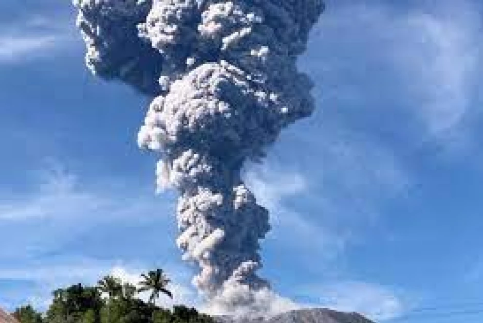A volcano in eastern Indonesia erupted on Sunday, sending an ash cloud seven kilometers into the sky. Authorities advised residents to shelter indoors. This eruption is the latest among approximately 100 eruptions from the volcano since early this year.
Mount Ibu, situated on Halmahera island in North Maluku province, erupted at 12:45 pm (0345 GMT). Geology Agency head Muhammad Wafid stated that the eruption produced thick ash clouds.
The volcano has been at the highest alert level in Indonesia’s four-tier system since mid-May.
The eruption lasted for 6 minutes and 13 seconds. Ash was carried by the wind towards the volcano’s monitoring station and an adjacent evacuation shelter, but National Disaster Mitigation Agency (BNPB) spokesman Abdul Muhari reported that “there was no panic” among the evacuees.
“People have been advised to avoid outdoor activities and shelter indoors while the ash mixed with sand is still raining down,” Abdul said.
Authorities urged residents to use masks to prevent respiratory problems following the eruption.
Since the volcano was raised to the highest alert level on May 16, locals and tourists have been warned not to enter an exclusion zone between four and seven kilometers (2.5-4.3 miles) from the volcano’s crater.
Evacuations began shortly after the alert level was raised, with more than 2,500 people moved to shelters as of Sunday, according to local disaster mitigation agency data.
Mount Ibu is one of Indonesia’s most active volcanoes, having erupted more than 21,000 times last year. The Geology Agency reported that Ibu recorded an average of 58 eruptions per day in 2023.
Indonesia, being situated on the Pacific “Ring of Fire,” experiences frequent seismic and volcanic activity. Last month, Mount Ruang in North Sulawesi province erupted more than half a dozen times, leading to the evacuation of thousands of residents from nearby islands.



